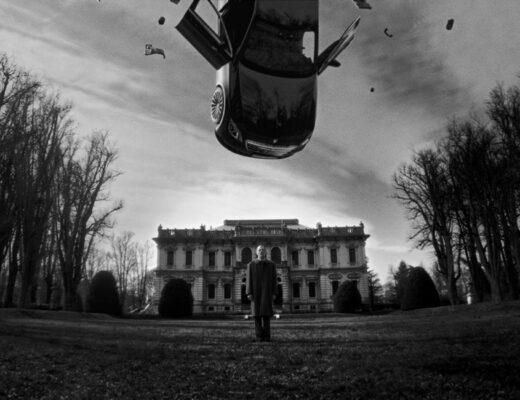Space and time are rendered deliberately unstable in Andrew Haigh’s All of Us Strangers. The film is anchored in a new, near-empty London high-rise where Adam (Andrew Scott), a middle-aged screenwriter, lives an apparently solitary existence. But its second crucial location is his childhood home in South London, which he takes periodic train rides to over the course of the film. In the former, he meets a gay man named Harry (Paul Mescal), one of the building’s only other inhabitants, whom he starts a relationship with. In the latter, he sees his parents. This latter encounter is as might be expected, of course — except that the pair are played by Jamie Bell and Claire Foy, who in their thirties are much younger than Scott’s Adam is. Later, we learn that Adam’s parents died in a car crash when he was 11.
Loosely adapted from Japanese writer Taichi Yamada’s 1987 novel Strangers, previously put to screen by Nobuhiko Obayashi under the title The Discarnates (1988), All of Us Strangers is a ghost story of sorts. Haunted by his past, Adam repeatedly returns to his childhood home to interact with his parents and hold imaginary, would-be conversations about where he is now, what he is doing with his life, and so forth. Haigh’s twist on this basic formula is that while Adam’s parents are the same age they were when they died in the ’80s, he is interacting with them as an adult gay man. This temporal and cultural gap allows for Haigh’s script to address all manner of issues about the changes in gay life, such as pivots in cultural acceptance of gay men and shifting attitudes toward AIDS. It also allows for the film to press the issue of how Adam’s loneliness is related to the wider social world. For if people like him are no longer outcasts, then who is to blame for his sadness and solitude? As he tells his mother, without quite seeming to believe it himself: “If I am [lonely], it’s not because I’m gay. Not really.”
The ambivalence of this “not really” also hangs over Adam’s relationship with Harry, whose own loneliness is plainly evident from the jump. Just as his scenes with his parents unfold like a chamber drama, Adam’s burgeoning relationship with Harry is depicted as a theatrical two-hander. No sense of the wider world ever intrudes on their interactions, and even when they go out for a night on the town and into a club, the environment is drained of any sort of social specificity. It later turns out that this sense of enclosure is deliberate. But what it means, dramatically, is that the central tension mainly comes from how Adam hovers between the film’s two central locations: a past home that is no longer and a present home that does not feel quite there.
The trouble is that the very conception of All of Us Strangers, with its supernatural hook, is somewhat at odds with Haigh’s general approach to psychological and behavioral credibility, as one finds in Weekend (2011) and 45 Years (2015). When Adam brings Harry to see his parents, Haigh can only see the incongruities resolving in psychological terms: the viewer must eventually be able to sharply separate the real from the imaginary. And by the end, this is precisely what the film, with its turgid twist ending, accomplishes. While such a commitment to a sharp real–imaginary split is not in itself a failing — indeed it is quite common — in this particular context, it creates an odd sort of circularity. The film’s story concept requires that there be no stable social world. The absence of a social world means that there is no behavioral interest to enliven the story concept. By suspending the viewer between liminal locales, All of Us Strangers clearly aims at a kind of otherworldly frisson, a sense of the unknowable. Mostly, though, it is just sad, somber, and a touch strained.
DIRECTOR: Andrew Haigh; CAST: Andrew Scott, Paul Mescal, Claire Foy, Jamie Bell; DISTRIBUTOR: Searchlight Pictures; IN THEATERS: December 22; RUNTIME: 1 hr. 45 min.







